Flipping houses is a fast-paced, high-stakes business. Unlike long-term rentals, each property flip is a separate, short-term project with unique costs, timelines, and financial risks. For a successful flip, knowing your numbers is critical. Generic accounting software can track your income and expenses, but it often fails to give you the insights you need to make profitable decisions on each flip.
This guide dives into how accounting for real estate flips differs from standard bookkeeping, what to look for in a system, and how to make the most of your accounting tools to maximize profit.
Key takeaways
- A house flip requires project-based accounting to accurately calculate the Profit/Loss and ROI for each specific deal, moving beyond simple income/expense tracking.
- The best accounting software for flippers must offer project-based cost tracking, renovation budgeting, automated holding cost allocation, and a real estate-specific chart of accounts.
- Baselane offers a comprehensive, integrated solution where AI-powered bookkeeping automatically categorizes and tags all transactions to a specific property (functioning as project tracking), reducing busywork for flippers and simplifying tax prep.
- Baselane allows you to separate their flip funds from rental or personal capital using unlimited, free virtual accounts while earning competitive [v="apyvalue"] APY² on reserves.
Why accounting for real estate flippers is unique
A classic mistake investors make is using basic property management software or a general landlord software to track a flip. This is like trying to put a square peg in a round hole.
A house flip is a short-term, project-based business venture, not a continuous rental income stream. The biggest difference in accounting for flipping houses vs. accounting for rental property is that your goal is not simply to track income and expenses; it’s to calculate the accurate ROI and Profit/Loss for every single property. Without software that is built for this granular, project-level tracking, you will struggle to get a clear view of your true profitability.
Real estate flipping isn't like managing a rental portfolio or running a traditional business. Here’s why:
Project-based accounting
Each flip is its own project. From purchase to renovation to resale, costs are tied to a single property. General accounting software aggregates transactions under broad categories, making it hard to isolate the financial performance of a single flip. Flippers need systems that let them track each property independently.
Short timelines and high turnover
Flips often last 3–12 months. With expenses piling up quickly, you need real-time tracking. Every missed invoice, untracked payment, or miscategorized expense can affect your ROI (Return on Investment).
Diverse costs
Expenses in flipping are more complex than regular business expenses. Differentiating between these is crucial for accurate budgeting and profit analysis. They include:
- Hard costs: Material purchases, labor, permits, and subcontractor fees.
- Soft costs: Loan interest, insurance, utilities, and staging.
- Operational costs: Marketing, legal fees, or administrative expenses.
Cash flow management
Unlike businesses with consistent revenue streams, flips are cyclical. You may have multiple properties in progress, each consuming cash for materials, labor, and holding costs. Accounting software for flippers should help you forecast cash needs for each project and avoid liquidity issues.
Tax implications
Lips are typically considered short-term capital gains if sold quickly. Accurate accounting helps you track deductible expenses, prepare for tax liabilities, and avoid surprises. Misreporting costs or failing to categorize them correctly can unnecessarily increase your tax burden.
Also read: 11 Best Property Tax Management Software
Key features to look for in accounting software for real estate flippers
This isn't just about general bookkeeping—it’s about having a system that provides clear, actionable answers for project success. Don't settle for software that lacks these core capabilities.
- Project-based cost tracking: Look for software that allows you to set up each property as its own project or job. This lets you track expenses specific to that property, compare budgeted vs. actual costs, and generate reports showing profitability per flip.
- Expense categorization: Software should support real estate flipping-specific categories for easy and automated accounting. Main categories include hard costs(materials, labor, permits), soft costs (insurance, utilities, staging), and operational costs(marketing, legal, software subscriptions).
- Budget vs. actual cost tracking: Flips are notorious for cost overruns. Software should allow you to create budgets for each property and compare them to actual spending in real time.
- Multi-account & multi-property support: Accounting software should support linking multiple accounts to the same property, separating personal and project finances, and reconciling transactions easily across accounts.
- Contractor and vendor management: Check if the software helps you track vendor invoices and payments, schedule payments to avoid late fees, and keep records for tax deduction purposes.
- Cash flow forecasting: Understanding your cash position is essential. The software should allow you to project cash needs for each property, plan for holding costs (mortgage, utilities, taxes) while the property is in progress, and identify when funds need to be transferred between projects.
- Tax preparation support: As flips often face unique tax scenarios, short-term capital gains, material deductions, contractor payments (1099s), and interest expenses. Look for software that helps you organize expenses by category for tax filing, and export data in formats compatible with tax software or accountants.
Also read: Best Real Estate Accounting Software for Investors
5 best accounting software for house flippers
The market is crowded, but only a few tools truly deliver the project-based accounting flippers need. We've evaluated the best accounting software for flipping houses that’ll meet your accounting needs.
1. Baselane
Trustpilot rating: 4.6 ⭐
Best for: Real estate investors who want to streamline banking, bookkeeping, and cash flow into a single platform for their entire rental and flipping portfolio.
Baselane is a financial management platform built specifically for real estate investors and landlords. While best known for its integrated banking and rent collection, its automated bookkeeping provides the granular tracking a flipper needs.
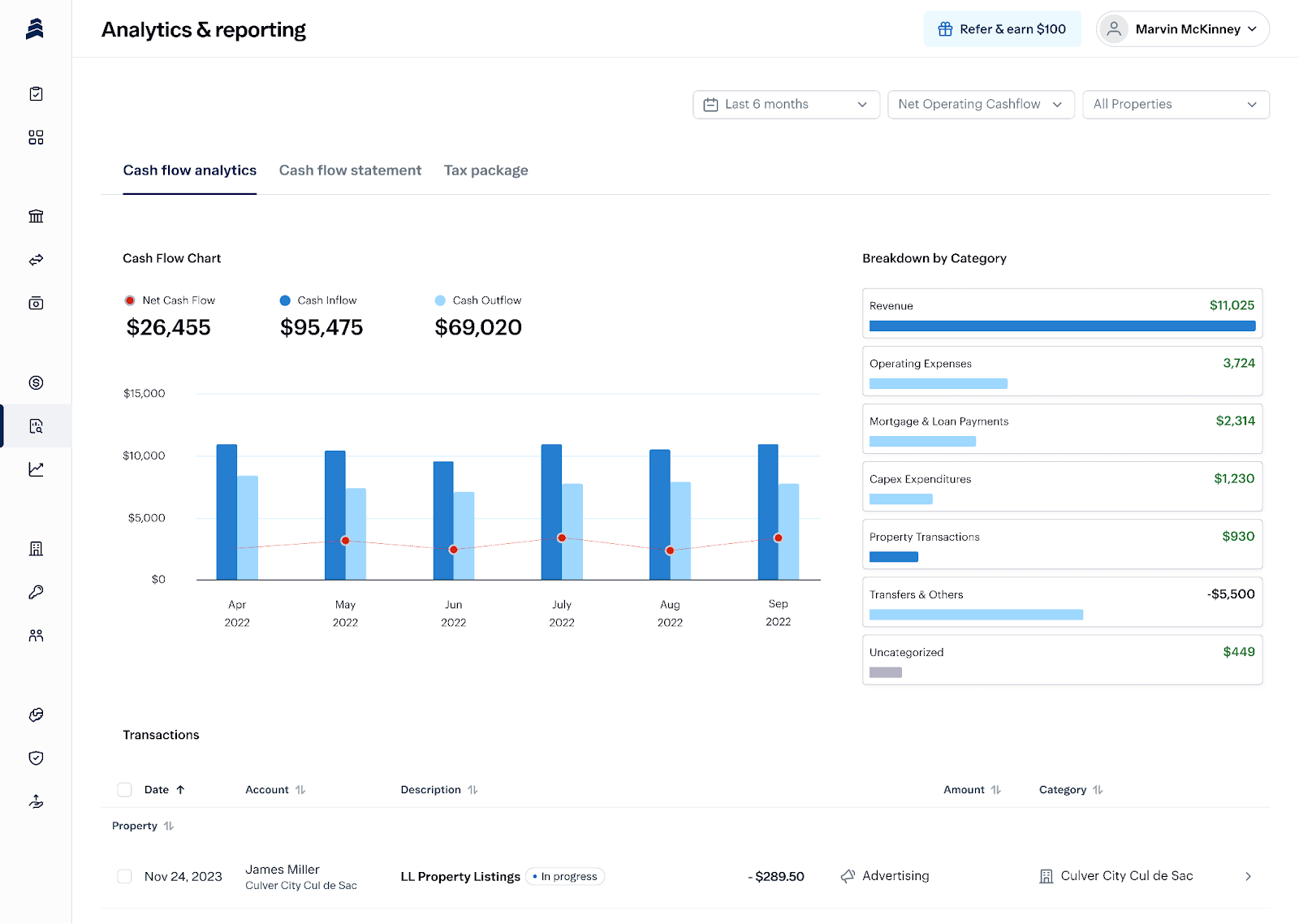
Key features
- AI-powered auto-tagging of all transactions to specific properties/projects and Schedule E categories.
- Unlimited property-specific checking and savings accounts to compliantly separate flip funds, holding costs, and rental deposits.
- Seamless integration with Baselane Banking for instant and accurate transaction data and centralized cash flow management.
- Automated tax package and Schedule E report generation at the click of a button to save time at tax season.
- Earn a competitive [v="apyvalue"] APY² on your reserves in high-yield savings accounts.
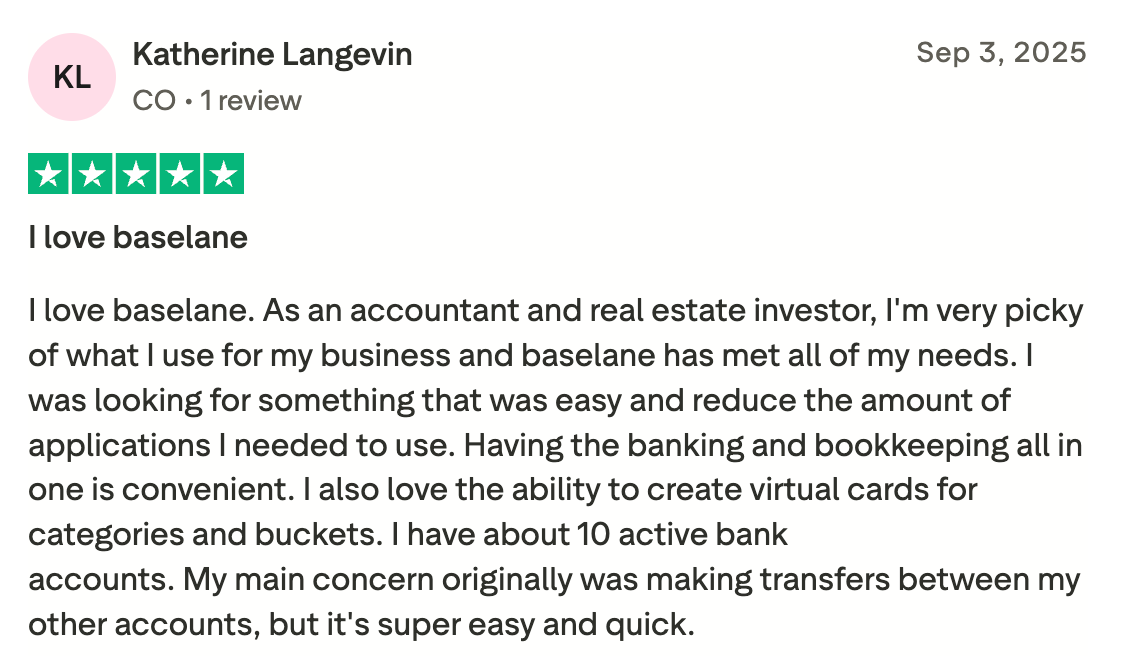
Pricing
- Baselane Core: Free with access to the integrated banking, bookkeeping, and rent collection features
- Baselane Smart: $20/month with everything in Core plus, custom categories, automated transfers, AI-based transaction tagging, and auto-receipt match.
2. QuickBooks
G2 rating: 4.5 ⭐
Best for: Flippers with a large volume of transactions or those with an in-house accounting team already familiar with the QuickBooks ecosystem.
QuickBooks is a feature-rich version of Intuit's core product, offering robust job costing features that can be configured for house flipping.
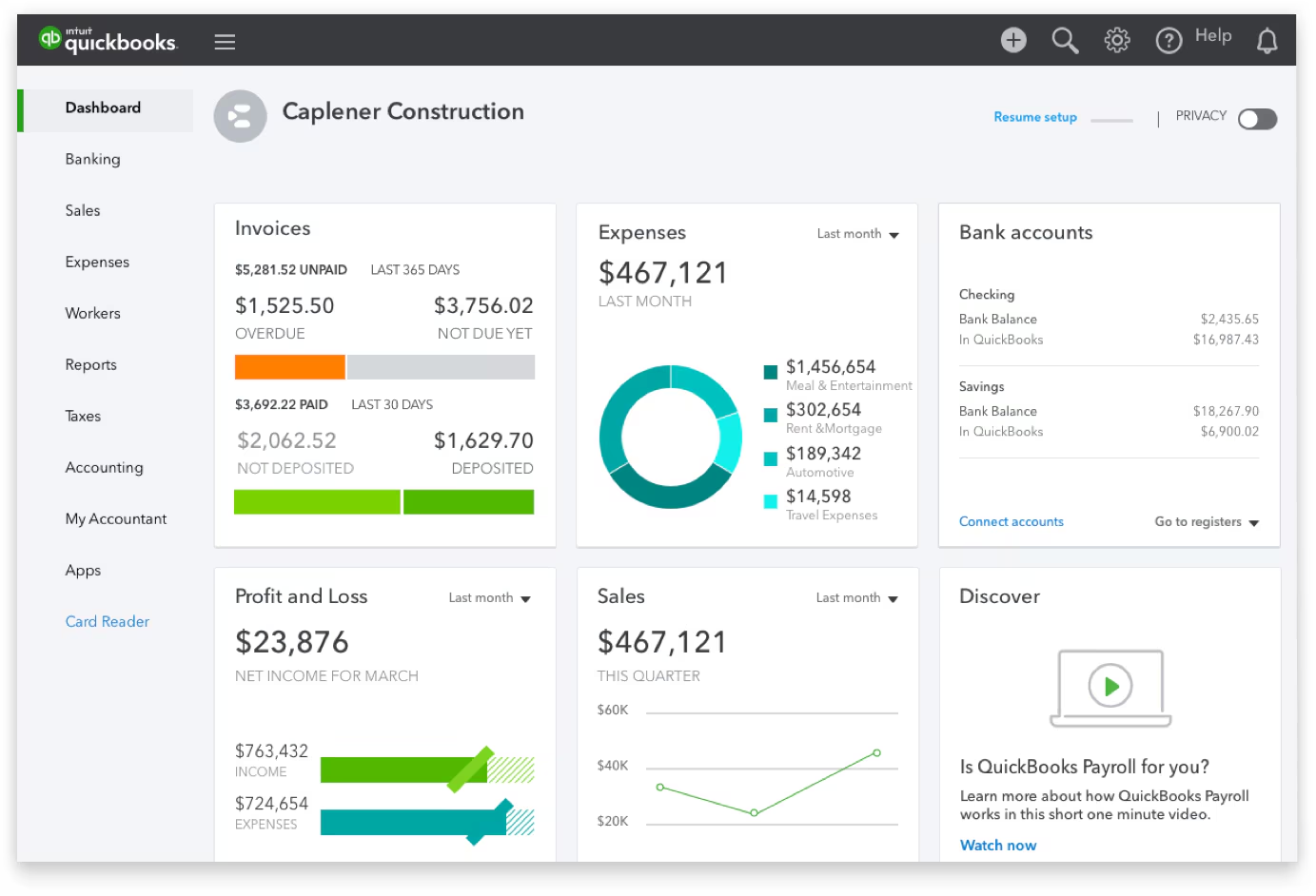
Key features
- Dedicated Job Costing feature for tracking expenses against a specific project.
- Robust inventory management and vendor tracking tools.
- Widely supported by Certified Public Accountants (CPAs).
Pricing
QuickBooks offers three paid tiers, each with a 30-day free trial.
- EasyStart: $28/month
- Plus: $95/month
- Advanced: $190/month
3. Buildium
G2 rating: 4.4 ⭐
Best for: Landlords with larger portfolios who need a comprehensive property management and double-entry accounting tool.
Buildium is a comprehensive property management platform that also includes accounting features. While primarily focused on rentals, its core accounting can be adapted for a dedicated flipping business.
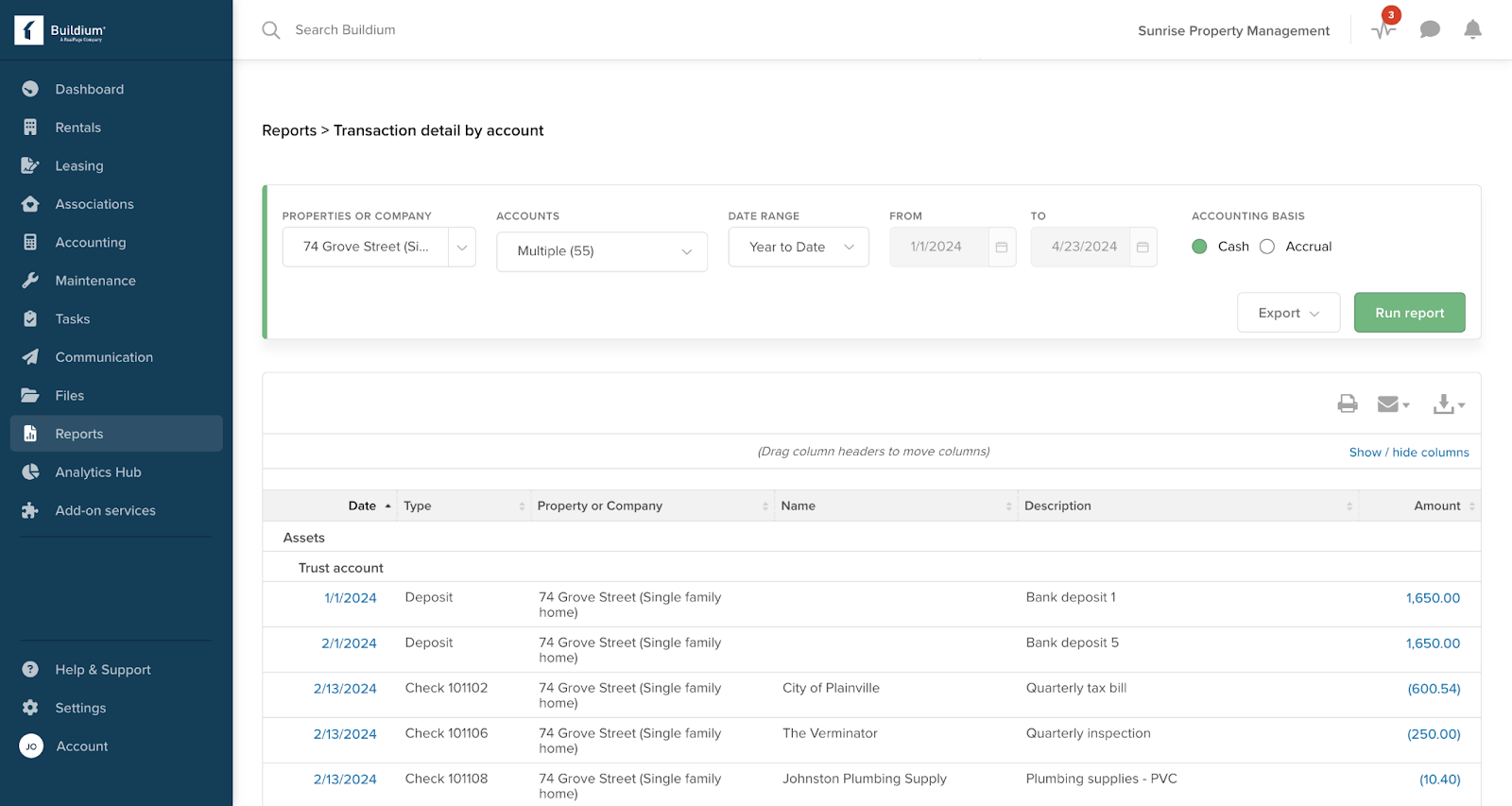
Key features
- Double-entry accounting system for high formality.
- Integrated suite of property management tools (listings, tenant screening).
- Ability to process expedited payments (1-2 days) on paid plans.
Pricing
Accounting features across all three of its paid tiers, including business bank accounts, standard reports, and report automation.
- Essential: Starts at $62/mo
- Growth: Starts at $192/mo
- Premium: Starts at $400/mo
4. REI Hub
Capterra rating: 4.5 ⭐
Best for: Rental property owners prioritizing simplicity and straightforward Schedule E reporting.
REI Hub is specifically designed for rental property owners and real estate investors, offering property-by-property reports.
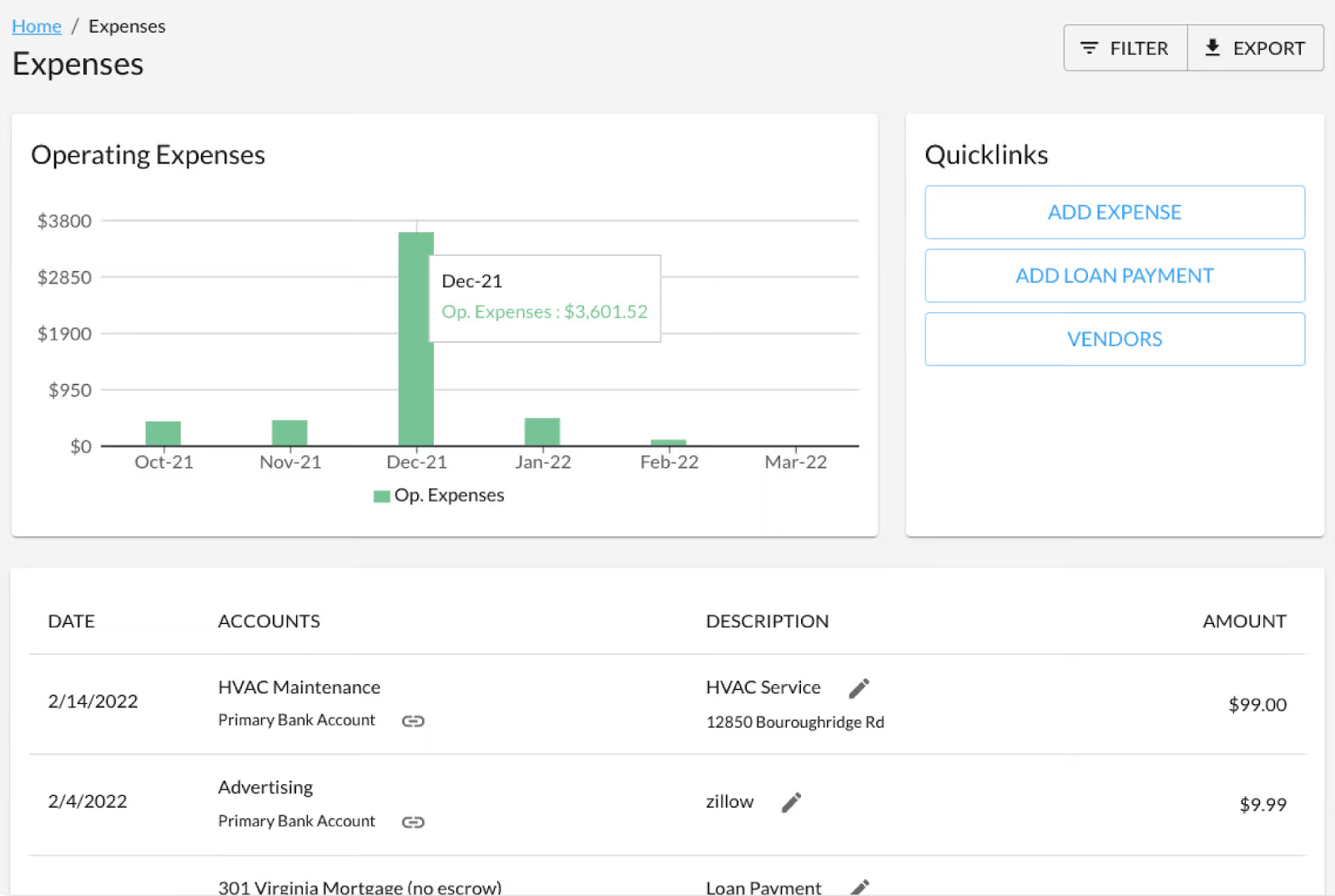
Key features
- Pre-configured for real estate, offering an editable chart of accounts and built-in Schedule E reports.
- Tracks income and expenses by property.
- Provides property-by-property reports and real-time cash flow breakdowns.
- Tracks mortgages, Loan-to-Value (LTV), and tenant documents.
Pricing
Starts at $15/month for up to 3 units, offering features including P&L or cash flow reports, asset tracking, and bookkeeping.
5. Appfolio
Trustpilot Rating: 3 ⭐
Best for: High-volume, enterprise-level property management
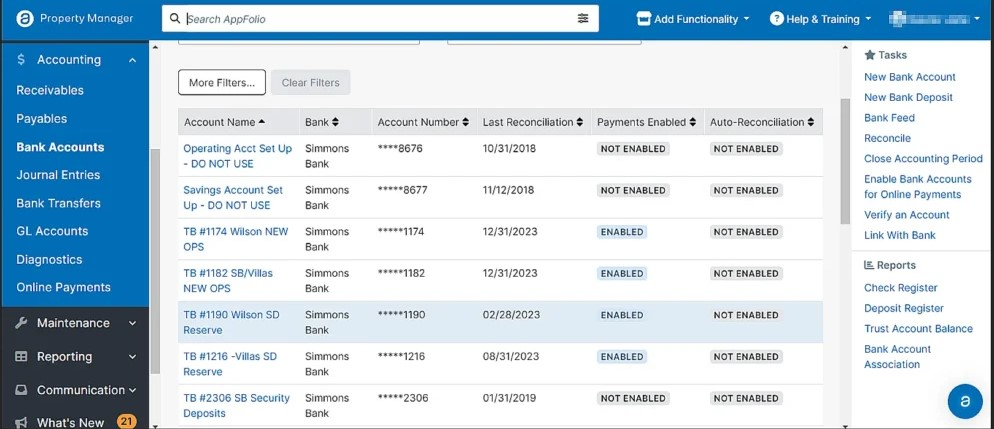
AppFolio offers an expansive, cloud-based platform that integrates leasing, maintenance, and communication tools alongside financial management. Its pricing is geared toward high-volume, enterprise use.
Key features
- Property accounting & reporting for financial diagnostics, corporate accounting, and custom reports.
- Vendor portals for transparent communication and real-time financial reporting.
- Online rent payments via ACH, credit card, and debit card.
- Maintenance management, including online requests, work order management, and tracking property inspection data.
Pricing
AppFolio offers a monthly subscription model divided into three tiers—Core, Plus, and Max. Pricing for each is available only through a demo.
House flipping accounting software feature comparison
Choosing the right software is about matching its core strengths to your specific needs. Here's a quick side-by-side comparison of the top five options for real estate flippers:
Tips for using accounting software effectively as a flipper
Review costs by property, not by month
Monthly profit and loss statements are useful, but they don’t tell you whether a specific flip is performing well. Looking at expenses grouped by address helps you understand where money is actually going and which projects are absorbing more capital than expected. This habit makes it easier to spot problem properties early, rather than realizing issues after the sale.
Pay attention to cost timing
Two flips with identical budgets can create very different financial pressure depending on when costs hit. Materials purchased upfront, delayed contractor invoices, or extended holding periods all affect cash differently.
So, track when expenses occur, not just how much they add up to. This helps you avoid cash shortages, especially when multiple projects are running simultaneously.
Revisit your numbers when the scope changes
Renovation plans change more often than you might expect. A structural issue, a permit delay, or a design upgrade can quickly shift costs. When that happens, revisit your financial assumptions instead of relying on the original budget. Adjusting projections as the scope changes helps keep profit expectations realistic and prevents surprises at the end of the project.
Keep cash visibility across active projects
When you’re running more than one flip, it’s easy to lose sight of how much cash is tied up in each property. Practical flippers monitor cash movement across all active projects so they know which ones are consuming the most capital and which are close to completion. This helps with planning future acquisitions and prevents overcommitting funds too early.
Reconcile regularly to catch small issues early
Flipping involves many small, fast-moving transactions. Missed charges, duplicate payments, or misclassified expenses can quietly add up. Flippers who reconcile their accounts regularly catch these issues while they’re still easy to fix. This keeps financial reports accurate and ensures decisions are based on real numbers, not assumptions.
Don’t let manual accounting sink your flip margins
The path to maximizing your next flip’s margin requires financial clarity and a single platform where your capital is organized, earning interest, and automatically compliant.
Baselane is the definitive choice, as it provides essential project-level tracking alongside integrated banking and bookkeeping, saving you countless hours of busywork and putting you in control of your financials.
Open a free Baselane account today, set up a separate checking or savings account for your next deal, and start managing your first flip as the independent business project it is.
FAQs
What are the unique accounting needs for house flippers?
Real estate flippers need project-based accounting to track costs such as acquisition, renovation, and holding expenses for each property. They need to calculate profitability and ROI per flip, unlike landlords who track ongoing rental income and expenses.
Can general accounting software work for real estate flipping?
Yes, general accounting software like QuickBooks or Xero can work for flipping if it offers robust project-tracking features (such as job costing or class tracking). However, they require careful setup and may lack real estate-specific reporting built in. A rental property expense spreadsheet might also fall short in keeping track of your finances as your house flipping business expands.
What features are essential in accounting software for flippers?
Some of the best accounting software for a fix and flip rental offers key features, including project-based tracking for individual properties, detailed expense categorization, renovation budgeting tools, the ability to calculate ROI per flip, and reporting suitable for tax preparation, like capital gains.
Why is dedicated software important for bookkeeping for house flippers in 2025?
With narrowing margins in 2025, precise cost tracking is vital for flippers. Dedicated or adapted software automates calculations, provides real-time financial monitoring, and helps ensure profitability is accurately measured and managed per project.
How can I track expenses for multiple flips effectively?
Using software that supports project or property tagging for transactions is key. Maintaining separate bank accounts per property can also help organize finances, and integrated banking and bookkeeping platforms can automate this process.
Do house flippers use Schedule C or E?
Most house flippers report income and expenses on Schedule C, because fix-and-flip activity is treated as an active business, not passive rental income. Schedule E is typically used for rental properties held for long-term income. If a property is rented temporarily during rehab, it may still be reported on Schedule C, depending on intent and duration.
How do I record utilities, taxes, and insurance during rehab?
Utilities, property taxes, and insurance paid during rehab are generally treated as project costs for the flip. These are considered holding or soft costs and should be tracked under the specific property until the flip is sold. They are not operating expenses in the traditional sense and should be tied directly to the project.
What’s the difference between fix-and-flip bookkeeping vs rentals?
Fix-and-flip bookkeeping focuses on project-level cost tracking and profitability, since income is realized only when the property sells. Rental bookkeeping focuses on ongoing income and recurring expenses over time. Flips emphasize capitalized costs and ROI per property, while rentals emphasize monthly cash flow and long-term performance.














.jpg)
.jpg)

